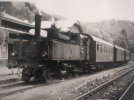Jein, yes and no. The DDR and the BRD at least had a lot to do with each other, so that the railway systems could grow together quite easily after 1989. I guess they cooperated as much as they could get away with.
A lot changed between 1945 - 1990 in most of the countries of E Europe, and they were processes. In some cases laws/policies were changed or enacted, in other cases things drifted and laws became less applied. I think the reality was that by c 1970, almost nobody really believed in the tenets of Marxist-Leninism, and this included party members and leaders. Many pretended to, of course, and they needed to do so to maintain their positions, but they could plainly see the west was delivering more and better living standards.
This was why it all collapsed so quickly in 1988-91. Once the different national leaders realised that with Gorbachov in charge, the Red Army et al were no longer going to intervene, they had to do some quick thinking - do we maitain the repression ourselves (and risk being brought before a court if it all goes wrong for us in any new system) or do we try to keep what we can and release things slowly?
.....
Gave up history at school, I became very interested in it later, is that typical?
It was for me, and I'm sure it is for many. A bit like languages too, I suspect.
I remember going to a History Society meeting after school one day aged about 13. It was a talk entitled "The origins of WW1", given by a sixth former, IIRC. I mean, I was interested, but trying to understand Serbian national feelings in Bosnia and Austro-Hungarian policies from 1,500 miles and 50 years distant - never having been outside the UK - it was all a bit of a knowledge overload.
Once you go to Sarajevo, or understand, for example, how incredibly close Turkey* was (and still is) to that area, things start to fall into place better.
* Actually, despite travelling by train and hitch-hiking to Turkey a dozen times, this was only brought home to me c 2009 when I realised the travel time by air from Vienna was that much less to Istanbul than to London.


